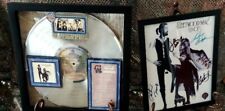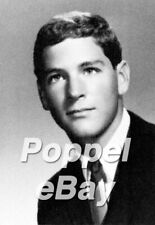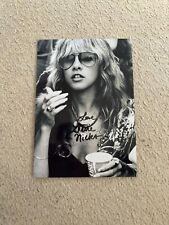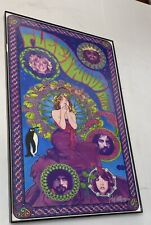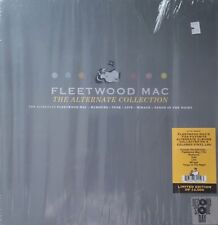|
Boston Herald on Green's Legacy Early genius of Fleetwood Mac remains ever Green Larry Katz Eric Clapton, Jeff Beck and Jimmy Page were three of England's blues/rock guitar greats in the late '60s. Peter Green was the fourth. But unlike Clapton, Beck and Page, the troubled Green's fame was short-lived. After quitting Fleetwood Mac, a band he founded, in 1970 he disappeared into the shadows of rock history. Now, the music of the forgotten-but-not-gone Green, 49, is enjoying a resurgence of sorts with three recent releases. Two are tribute albums. "Rattlesnake Guitar," which takes its name from the Fleetwood Mac chestnut "Rattlesnake Shake," is a sporadically inspired two-CD set of Green covers with a heavy emphasis on old-timers, among them Jethro Tull's Ian Anderson, the late Rory Gallagher, Arthur ("Fire") Brown, Zoot Money, saxophonist Dick Heckstall-Smith, Harvey Mandel and former members of Blodwyn Pig, Savoy Brown, Uriah Heep, Manfred Mann and the Yardbirds. "Blues for Greeny" is a more consistent and satisfying single CD tribute by British blues guitarist Gary Moore, last heard standing in for Eric Clapton with BBM, his Cream-come-lately project with Jack Bruce and Ginger Baker. Moore delivers the most restrained and sensitive playing of his career caressing Green's blues on the 1959 Gibson Les Paul guitar he bought from Green himself some 25 years ago. With his emphasis on soulful economy and his disdain for flash, Green can only be considered a good influence on the world's overabundance of six-string showoffs. Green's genius, or at least riveting flashes of it, can be encountered firsthand on the two-CD, "Live at the BBC" by Peter Green's Fleetwood Mac, as the group was billed in its early years. Recorded between 1969 and 1970 and recently compiled by Fleetwood Mac drummer Mick Fleetwood, these 36 songs showcase a very different group than the mega-selling Lindsey-Buckingham/Stevie Nicks' Mac of the mid '70s. Born Peter Greenbaum to a poor Jewish family in London, Green first gained notice when he temporarily filled in for his idol, Eric Clapton, in John Mayall's Bluesbreakers. When Clapton left the Bluesbreakers for good to start Cream in 1966, Green got the Bluesbreakers' job. To the surprise of most everybody, Green proved Clapton's match. Green's partisans countered the "Clapton is God" graffiti popular in London at the time by scrawling a new slogan: "Peter Green is better than God." Green's incisive work with the Bluesbreakers (as well as that of his predecessor Clapton and successor, future Rolling Stone Mick Taylor) can be heard on the Mayall compilation "London Blues." But the Green God, as he soon was known, was as shy as he was ambitious and not at all comfortable in the role of guitar deity. In 1967, he formed Fleetwood Mac, a group purposely named for its rhythm section of ex-Bluesbreakers Mick Fleetwood and John McVie. Green further deflected attention from himself by hiring a second guitarist, singer and songwriter, 4-foot-11-inch Jeremy Spencer, kiddingly known as "the smallest man in rock." A year later, Green brought in yet another guitarist, singer and songwriter Danny Kirwan. With its three quite different frontmen, the Fleetwood Mac presented on "Live at the BBC" is more than a Chicago-by-way-of-the-Thames blues band. Spencer veers from spirited homages to slide guitar great Elmore James to fun-filled imitations of Elvis Presley and Buddy Holly, while throwing in a cover of Tim Hardin's heartbreaking "Hang on to a Dream" for good measure. Kirwan's originals acknowledge the pervasive influence of the Beatles at the time by bringing a Brit-pop sensibility to the proceedings. Green, no purist, is not adverse to having a giggle himself, as a cover of Lynn-native Freddy Cannon's "Tallahassee Lassie" proves. He shows his rowdy side, too, with his hard-rockers "Oh Well" and "Rattlesnake Shake." But it is on his straight blues numbers and atmospheric guitar pieces that Green displays his exquisite guitar touch. Avoiding florid displays of technique, he strives to wring the maximum amount of emotion from each carefully chosen note. As B.B. King said in his famous quote about Green, "He's the only one that ever gave me cold sweats. He had the sweetest tone I ever heard." Green's playing is tantalizing in its promise. But in 1970 he left Fleetwood Mac, his best work and likely his sanity behind. Apparently Green's tendencies toward depression and instability were exacerbated by several LSD trips. He demanded that Fleetwood Mac donate all its money toward ending starvation in the Third World. When that idea didn't fly, he quit the group. After one very uneven solo album, he abandoned the music business he despised to pursue his newfound interest in Christianity. In the '70s, Green worked as a gravedigger and hospital orderly before several stints in mental institutes where he was diagnosed schizophrenic. In the late '70s-early '80s he re-emerged to make three disappointing small-label solo albums. Since then, he's lived in London, where he's known as an eccentric recluse. Last year, he met with Fleetwood, who said Green supported his efforts to recover royalties owed members of the early Mac. More recently, Green was reportedly seen jamming in clubs and hinting at plans for another solo recording. Maybe Green can mount a comeback of note, but, in truth, no one seriously expects it. More likely, he'll remain a tragic enigma. His music from nearly 30 years ago, like that found on "Live at the BBC," is a reminder that Peter Green is rock guitar's great lost soul.
|





